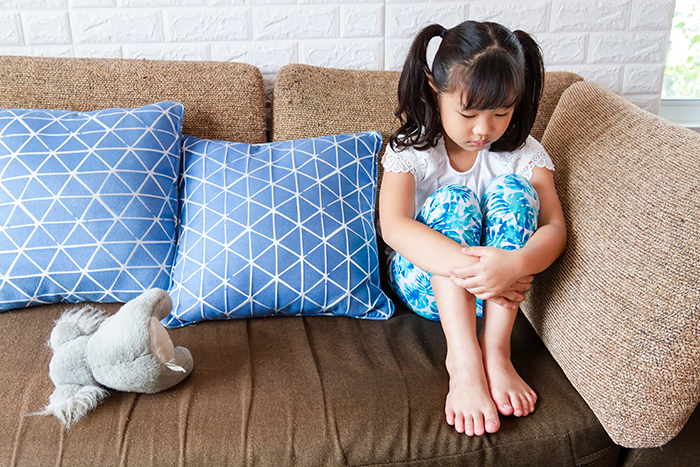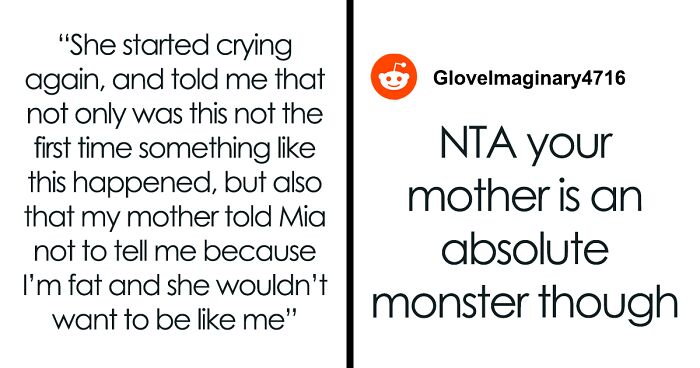Having a relationship with grandparents is important in every child’s life. As long as it’s a healthy relationship. For example, if a Grandma fat-shames her granddaughter to the brink of tears, it doesn’t sound healthy, right?
Yes, that’s the example from today’s story. It’s told by a woman who was brought up by a fat-shaming mom, and while she thought her mom had changed her attitude, when her daughter came back crying after a weekend with her, she understood that she hadn’t. This put her in quite a pickle – she doesn’t want to subject her kids to such toxicity, but she also doesn’t want to be a jerk who bans them from seeing their grandma.
Children having a relationship with their grandparents is important, as long as that relationship is healthy

A woman who grew up with a fat-shaming mom fixed her relationship with her body and the mom after moving out

The OP, who currently is a 31-year-old woman, grew up with a fat-shaming mom. There can be various reasons why parents tend to fat-shame their children.
Sometimes a parent themselves is struggling with their body image and projects it onto others. This most commonly applies to women, as society often expects them to be of a certain body type. Here, this Buzzfeed video shows what kind of body types were considered “ideal” at different times. Yet, every woman being of the same body type is unrealistic. Thus, it makes those who don’t look like that self-conscious.
Now, she has a daughter who adored her grandma until she started fat-shaming her to the verge of tears, and so she banned grandma from seeing the kids without a chaperone
That, over time, can evolve into severe body image or even body dysmorphia problems. The latter is considered a mental health condition, where a person basically can’t stop thinking about their flaws, which are usually unnoticeable to others.

Even if a parent doesn’t have body dysmorphia, they still might be set on the idea that there’s only one correct way to look – the “ideal” body type. As the previously discussed video shows, in current times, thin bodies are idealized. So, those who aren’t as thin as these “ideals” tend to fat-shame themselves and/or others. Parents aren’t an exception to that.
Fat-shaming doesn’t motivate people to lose weight; it only makes them feel bad about themselves and damages their mental well-being. So, when children are living in an environment where they’re constantly shamed for their looks, they can grow up to have mental health and body issues.
Now, the woman’s son wants to invite grandma to his birthday party, so the woman is wondering if she should let him or not, since she doesn’t want her mom around the kids
The OP is a perfect example of this. She opened up that being raised by a mother who criticized her weight impacted her self-esteem. She also used to lose unhealthy amounts of weight to please her. Only leaving the house and extensive therapy helped her to develop a healthy relationship with food, exercise, and even her mom.
Nine years ago, the woman had a daughter, who she dubbed Mia in the story. She is lovely and adores her grandma. So, one weekend the girl and her younger brother spent the weekend with their grandparents. On the way home, the mom noticed that her daughter wasn’t as bubbly as she always was. That’s when Mia started bawling.

Apparently, one afternoon the grandparents and siblings went for ice cream. The girl wanted 2 scoops, but grandma didn’t let her, saying she was fat and needed to lose weight or else nobody would find her attractive. Mind you, the girl is only 9 years old! Plus, she’s not even overweight and has a very healthy body for her age.
This made the OP livid. She suffered her whole childhood with fat-shaming and she doesn’t want her daughter to experience that. So, she called her mom and scolded her for such behavior. She also informed her that from then on she was not allowed to see her daughter without a chaperone.
The grandma didn’t like this and said that her daughter was overreacting, because the granddaughter was exaggerating. Then, she tried switching the blame, saying the girl must have picked up these thoughts in a dance class or that the mom was projecting them onto her.
The OP talked with her daughter to make sure what her mother said wasn’t true – and it wasn’t. With this conversation, the woman also learned that the ice cream incident wasn’t even the first of this kind. The grandma told Mia to not tell the author anything because she’s fat and the girl shouldn’t want to be like her.
After hearing such awful words, the original poster called her mom again, who then called her fat straightforwardly. Now, the woman is at a crossroads – her son’s birthday is coming up and he wants his grandma there, but she doesn’t want her to be around her kids just yet. So, she came online to ask if that made her a jerk.
Folks online assured her it doesn’t. They agreed with her that she needs to protect her children from people who can do lasting damage to their self-esteem. After all, the girl is already distraught and a proper grandparent shouldn’t want to make her even more miserable. The OP has suffered enough and she’s cutting off this never-ending circle of body image problems.
Since there’s no update, we aren’t sure what the woman ended up doing – inviting her mom to her son’s party or not. If she did, let’s hope she didn’t have a chance to spread her fat-shaming ideals. And if she didn’t, well, maybe it’s for the best since, as many people online noted and even the OP’s history showed, getting distance from a person like that can be healing.



